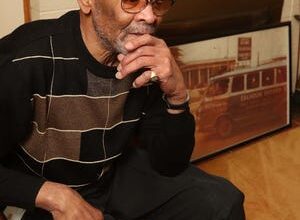Sean “Diddy” Combs spearheads Black-owned online marketplace

The entrepreneurial spirit is a cornerstone of American culture, but history books too often leave out the extensive contributions of minorities and women. In honor of Black History Month, Stacker is shining a light on 50 Black entrepreneurs who made a lasting influence on the business world—and, often in the process, civil rights—from the Revolutionary War to today.
The abrupt end to slavery in 1865 following the conclusion of the Civil War freed about 4 million people but left them without a clear trajectory forward. Black Codes afforded freed people the right to sue in court and marry but stipulated other lopsided rules like keeping them from serving on juries or in state militias.
During the Reconstruction Era, which lasted until 1867, the government sought to mitigate the fallout from slavery and integrate African Americans into society. But white business owners withdrew from Black clientele and kept African Americans from participating in the industrial sector, refusing to hire Black workers for white-collar jobs. By the 1880s, “Jim Crow” laws controlled the South and became the new slavery. And the U.S. Supreme Court, in the 1896 Plessy v. Ferguson case, ruled states could legally require racial segregation that kept whites and Blacks separate but (hardly) equal.
Out of this system sprung the need for businesses willing to serve marginalized African American clients. Also known as “double-duty dollar,” this era marked the modern birth of Black Americans’ entrepreneurship: an independent, empowering economic and social system by which Black businesses served, were patronized by, and created jobs for their own communities. Booker T. Washington’s 1900 National Negro Business League (later the National Business League in 1966) promoted these Black businesses, including many featured in this gallery. Black-owned businesses doubled in less than two decades between 1900 and 1914, from 20,000 to 40,000, according to the NNBL. Those businesses ranged from undertakers and drugstores to retail merchants.
In 1927 Secretary of Commerce Herbert Hoover organized a Division of Negro Affairs to help businesses attract Black consumers. While the entire business industry stagnated during the Great Depression from 1929 to 1939, Black workers were disproportionately affected by being the “first fired and last hired,” and small businesses were forced to close when unemployed patrons didn’t have money to spend. As the U.S. geared up for World War II, the Division of Negro Affairs worked with Black-owned businesses to gain defense contracts (largely to no avail), and by 1953 President Eisenhower had disbanded the division. Then, as the wartime effort began, Black people left their own neighborhoods to pursue bigger industrial and manufacturing jobs in cities, which, in turn, they were left without when WWII ended.
Despite the inroads made by the work of the civil rights movement in the decades that followed, big business largely ignored Black consumers and rarely made inroads with hiring Black people for managerial roles. But in the 1960s, Lyndon Johnson created the Office of Economic Opportunity within the Small Business Administration to leverage black entrepreneurship against America’s war on poverty. Then, President Richard Nixon created the Office of Minority Business Enterprise to help advance civil rights while defusing racial tensions.
By the 1970s, civil rights further expanded, federal programs promoted minority businesses, and monetary assistance (from loans to grants) for Black businesses also grew—and the walls began to come down. This time saw the rise of many successful Black business leaders and trailblazers from this list make the American Dream a reality. Earl G. Graves Sr. first published Black Enterprise in 1970, a magazine that has since become the main resource for prospective or current Black business owners. In 1979, Sheila and Robert Johnson created BET, a pioneer of Black media and lifestyle, and the two became the first Black billionaires upon selling to Viacom by 2001. In 1986 Oprah Winfrey launched Harpo Studios, which produced some of today’s most popular talk shows and contribute to Oprah’s $2-plus billion individual net worth.
Through all barricades to advancement and daring steps forward, Black-owned businesses in the U.S. today account for billions in revenue and employ thousands of people.
You may also like: 50 Black athletes who transformed American sports
























































